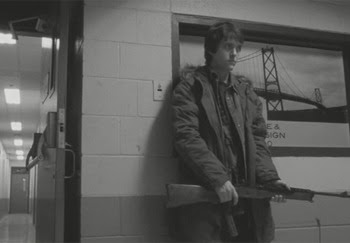Polytechnique (2009) is one of those movies that wallows in violence, but wants us to appreciate the artiness of it all.
There's a major mass shooting every so often - they seem to be yearly happenings now - and there's usually a movie or a documentary to follow. Some are good; some merely exploit sad events. Some, like this one, spread the blood around like Jackson Pollock dripping paint on a canvas.
The problem with these movies is the same one that happens in anti-war films. In order to have something to react against, you must show the violence. And violence, in war movies and in stories about mass shooters, is compelling. It's no surprise that the earliest movies made by Thomas Edison featured boxing; violence captivates a viewer, and taps into our basic predatory instincts. We're supposed to be rooting against the very thing that is enticing us.
That the murders are being exploited is not the real issue, though. The problem is the movie's lofty tone.
A young man with a vendetta against women strolled through a school in Montreal in 1989, armed with a rifle and shooting at "the feminists who have ruined my life." We learn about his hatred of feminists from a hastily written note he composes at the movie's start. We know nothing else about him; we see him staring out the window of his small apartment in a daze; he washes the breakfast plates and then writes his note. Off he goes to his killing spree, and damned if the movie doesn't perk up like a race horse. He scowls, he reloads, he shoots; the halls of the school are soon awash in the blood of feminists.
The plight of the poor women being shot at by a testosterone charged bogeyman is supposed to move us to tears. It almost does, except the director keeps butting in. There's a ridiculous moment where, in the middle of the chaos, the camera stops on a poster of Pablo Picasso's Guernica - a lead-footed attempt to compare the murder of the women to a sort of civil war. The female students, of course, are shown as sweet, hardworking, brilliant young things of lamb-like delicacy. When not studying, they shave their legs for job interviews, only to have their aspirations frowned upon by unattractive middle-aged geezers. At least the women have names. The shooter isn't identified in the movie's credits; he's just "the killer."
The man wasn't born hating women. What happened to him? The director doesn't care; he wants only to show us something terrible. The shooter's name in real life was Marc Lepine; he killed 14 women and wounded many more before killing himself. The movie depicts some of the actual events that came to be known as the "Montreal Massacre," but also throws in some fictional characters. It's nearly as deadpan as Gus Van Sant's Elephant, which was about the Columbine shootings, but there's an underlying theme in Polytechnique that is a bit of a turn off. Namely, that the real tragedy is that the victims weren't merely housewives or store clerks, but were, in fact, educated young women going for their engineering degrees. I'm not certain that an educated person's life is more valuable than, say, someone who doesn't want to design airplanes.
If Polytechinque is too self-important to be a first rate movie, it does have some merits. It's filmed in a murky black and white, and the brewing snowstorm outside gives the school a melancholy, snow globe effect; when frightened students escape out the windows into the snowy dark, they seem to disappear, as if the usually safe confines of the school protected them from nebulous dangers outside. Director Denis Villeneuve surprises us with some Tarantino-esque time play, moving back and forth between events, and Maxim Gaudette is properly grim as the shooter. Karine Vanasse does her best with the heavy-handed role of Val, a survivor of the attack.
On the whole, though, there's something preachy going on. Val has a line near the end when she says, "If I have a son, I will teach him to love. If I have a daughter, I will teach her that the world is hers." This sort of fluff seems scraped from the Oprah channel, or pinched from a pregnant woman's Facebook page.
That leaves the question about exploitation, I guess. One of the first mass shooters, Charles Whitman, who shot and killed 14 people from a tower at the University of Texas in 1966, was portrayed in a movie just a few years later by Kurt Russell. Mass shooters have remained a favorite subject of filmmakers ever since then, and the movies always include dour announcements at the beginning or ending about how this sort of savagery has to end. Of course, in between these announcements, we get 90 minutes of movie mayhem.
The same thing goes on here. The shooter picks off victims, and they drop in ways both artful and horrifying. Because the movie is in black and white, the blood spreads on the floor and the walls like a black oil slick. At the end, the closing credits include the names of the women killed in the actual Montreal shooting. But rather than feel sad, I was struck by how the names looked like a list of bestselling authors, or the high scorers in an old game of Donkey Kong.

No comments:
Post a Comment